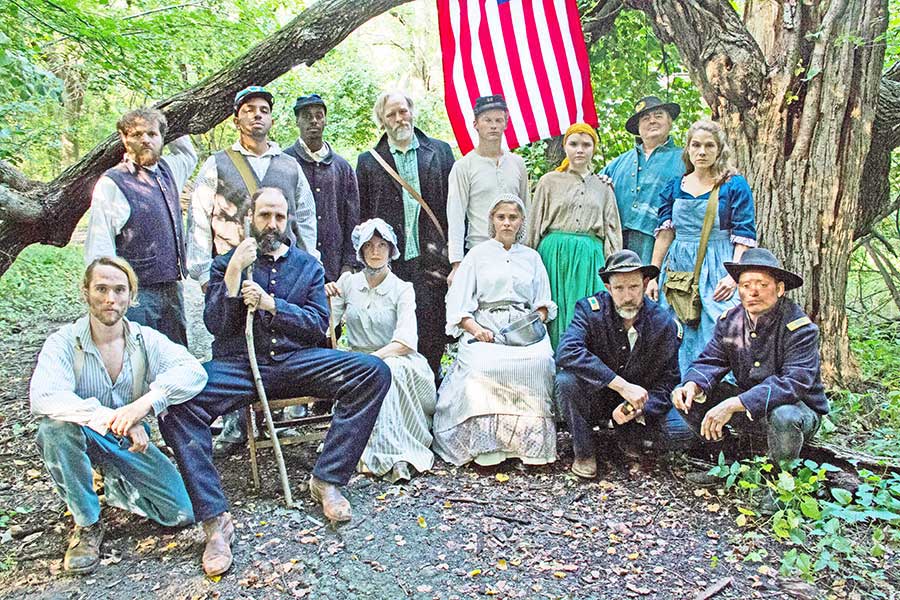Best known as the author of “The House of Blue Leaves,” “Six Degrees of Separation” and the screenplay for “Atlantic City,” John Guare is an Irish-American playwright with a sense of oddly realistic whimsy that’s only matched by his erudite language and his gutsy pragmatism.
Philadelphia’s EgoPo Classic Theater will present Guare’s “Lydie Breeze” trilogy beginning this month. EgoPo’s director/founder Lane Savadove will stage them as separate plays: Part I (Jan. 31-Feb. 11), Part II (March 7-18) and Part III (April 11-April 22); then, from April 26-May 5, as a three-play marathon at Old City’s Christ Church Neighborhood House.
Several LGBT actors and directors are part of the production, including actor Shamus McCarty, actor/associate director Dane Eissler and actor Hannah Gold.
PGN: What’s your take on how Lane operates?
SM: Lane is a man of incredible passion and I am amazed he can keep his head on straight and bring new ideas into the room every day while directing and producing this beast of a project.
DE: Lane works fast and he works hard — moment-to-moment blocking. Really digging into every moment before moving forward to the next scene. He also helps the actor with a physical vocabulary using Viewpoint and Roy Hart that really grounds the acting in a visceral way. It’s hard and exhausting work, but really pays off.
HG: I haven’t collaborated with Lane before, but have seen his work and have always been struck by his interest in bodies in space. His work is generously alive, from a physical and aural perspective. All of his shows — that I have seen — involve ensemble-made music. His production of “Gint” included sequences where actors transformed into animals and landscapes. As audiences, we are drawn in by music and by the experience of seeing a human body transform into an animal, for example, or become enveloped into a flock of other bodies. We lean in and get excited by the possibilities for sound and movement that the human body is capable of, and I feel like that is at the crux of Lane’s work.
PGN: What is your specific role and how does it relate to Lydie Breeze’s overall arc?
SM: In this show, they’ve yet to find a use for my mediocre xylophone skills. I am performing in a variety of roles including a scared solider afraid of dying anonymously; an insurance investigator, who serves as prosecutor, judge and jury; a variety of sailors and a pig and that is just [in Part I], “Cold Harbor.” In Part II, I return as an Irish cop and end the trilogy as a love-struck inventor with a mouth that moves faster than his brain.
DE: I’m in a very unique position being on both sides of the table. For the entire trilogy, I act as associate director, which, for this particular project, means I help Lane work through script analysis and blocking ideas, as well as helping coordinate design ideas and overall production aesthetic. And then, for Part III of the trilogy, I swap my associate-director hat for my performer hat, and take on the role of Jude, an 18-year-old Christian scientist bird-bander. Jude is such a warm, curious and open person, who happens to be brought up in a strict cultural structure.
HG: I play an Irish servant, Beaty, who arrives on the scene in Part II after being recruited to care for a child. My character then outlives Lydie Breeze and ends up caring for her daughters in Part III. She is fascinating in that she ends up being an outsider in a community of outliers, which gives her a unique vantage point. One of the neat things about this character track is that she ages significantly between Parts II and III. It’s an exciting challenge for me as an actor, because I play her as a teenager in Part II and then as an adult in Part III.
PGN: Not as blunt as a tweet but describe in as few words as possible the “Lydie Breeze” experience?
SM: It forces us to examine the violent and genocidal history of white wealth in America and how it was the direct result of the abuse of enslaved people of color, specifically black people. This is an essential conversation for now and I am happy to be part of work that presents that as a definitive truth.
DE: It’s a story of one man’s acceptance that compassion trumps ego. When we’re young, we cling to the idea of immortality and importance — to be giants! And as we grow, we learn that life is all about sharing and others. To me, the “Lydie Breeze” experience is all about letting go of the self and embracing one another.
HG: The trilogy feels to me like a cautionary tale, in some ways. It feels like an update of “Paradise Lost,” a manifestation of the dangers of having a poetic soul. The four main characters envision a radical new world that ultimately falls into decay. It is a story that encompasses both the ecstasy and then the inevitable (depending on your worldview) agony of having hope.

